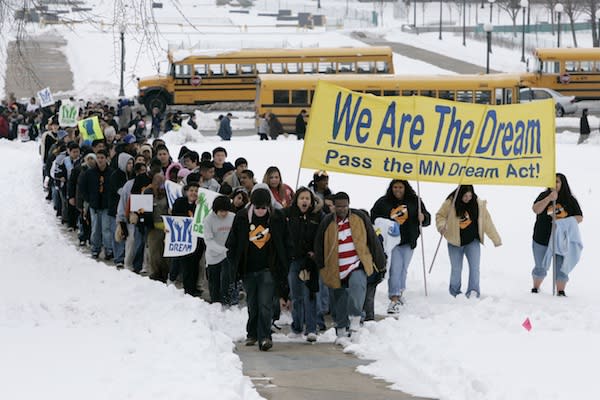 The Lookout
The LookoutImmigration memo called ‘backdoor amnesty’ by ICE union

A memo by a top Immigration and Customs Enforcement (ICE) official--urging agents to consider age, education status, health and other factors when deciding whether to deport an illegal immigrant--has caused an outcry on the right that the Obama administration is attempting to secretly push through immigration reform.
"This memo is really a de facto Dream Act done administratively," Federation for American Immigration Reform (FAIR) spokesman Bob Dane told The Lookout. Dane is referring to the failed 2010 bill that would have allowed young people who were brought to America as children to gain legal residency if they went to college or joined the military.
The view that the memo amounts to a Dream Act or immigration reform by fiat flew through the conservative blogosphere last week.
But immigration experts on both sides of the spectrum are divided on whether the new statement of priorities represents much of a departure from the agency's normal operation.
In the memo, ICE Chief John Morton reminds agents that they can practice "prosecutorial discretion" in deciding which people to attempt to deport in court. The Obama administration has consistently said its priority is to deport illegal immigrants who pose a safety threat to their communities or have engaged in immigration fraud. But this memo lays out that position in far greater detail, asking agents to take "particular care and consideration" when illegal immigrants are veterans, minors or elderly, have been in the United States for a long time, are the victims of crimes, or are pregnant or suffer from health problems.
Ali Noorani of the pro-reform National Immigration Forum told The Lookout that though the memo is largely a compilation of the administration's stated immigration priorities, it is noteworthy for stressing that ICE agents at many levels can use prosecutorial discretion.
"At the end of the day it means that an attorney within ICE, instead of spending his time prosecuting a landscaper, can go after a criminal," Noorani says.
He points out that Clinton official Doris Meissner articulated a similar policy of prosecutorial discretion in 2000 for the precursor agency to ICE, the Immigration and Naturalization Service.
Marshall Fitz, director of immigration policy at the liberal Center for American Progress think tank, told Mother Jones that the memo is more of a "reminder" of the policies ICE already says it adheres to under the Obama administration. Immigration attorney and activist Matthew Kolken wrote on Twitter that the memo doesn't mean much because it's unlikely that ICE attorneys actually would decline to deport based on the guidance.
The ICE union that represents more than 7,000 agency employees--mostly career agents who are not political appointees--called the policy a "law enforcement nightmare" and "backdoor amnesty." Union leaders issued a no-confidence vote in Morton earlier this month. But that conflict is also not new: Union advocates released a previous vote of no confidence in Morton last August, arguing that ICE agents were discouraged from making any arrests of illegal immigrants who were not already booked in jails.
Either way, Obama has presided over a record-breaking number of deportations. ICE increased the number of convicted criminals it deported by 70 percent in two years--from 114,415 in 2008 to 195,722 in 2010, by using its "Secure Communities" fingerprinting program that scours local jails for illegal immigrants. Nearly 400,000 people were deported in fiscal 2010, about half of them with no criminal records. Morton said 400,000 represents the maximum number of deportations the agency can handle per year.
At the same time, The Houston Chronicle notes that about 40 percent more deportation cases were dismissed during the 2010 fiscal year compared with the previous year. It's unclear how many of those cases were dismissed by ICE attorneys using prosecutorial discretion versus prosecution dismissed by immigration judges on their merits, the paper says.
(A Dream Act rally in 2007: AP)
